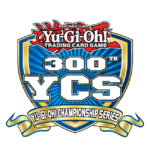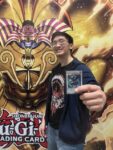
Tournament Policy Update
Since Tournament Policy documents require ongoing updates and amendments to keep pace with Organized Play, we are pleased to present you with Version 2.4 of the Official KDE-US Yu-Gi-Oh! TRADING CARD GAME Tournament Policy!
We do not have a lot of changes in this version – you will find updates on the use of Yu-Gi-Oh! NEURON, some clarifications on Unsporting Conduct outside of an event, and a visual reference for use in identifying TCG cards vs. OCG cards.
You will need to know all this information to properly prepare for tournament play, but don’t worry! We have prepared this article about the major changes and what they mean for you. This is not a list of each and every change, but it will explain the more significant ones. As you read through this article, have a copy of the policy document open too, and refer to it as you go – reading this article by itself instead of reading the policy document won’t provide you with all of the information you need to be ready for tournament play.
Most of the sections in the policy document itself will have example charts that will help you understand how the policy works.
Let’s take it section by section!
Also note that previous subsection designations will have changed, due to adding in new subsections.
Section I. Preparing to Play
This section discusses the roles of various attendees at an event, including what is required and/or expected of them.
Changes to this section include:
Subsection A. Duelists
What changed?
- Yu-Gi-Oh! NEURON (NEURON) has been added as a source for CARD GAME ID numbers.
What does this mean?
Physical CARD GAME ID cards are no longer being distributed, and if you are a new player and need a CARD GAME ID number to participate in tournaments, you can generate one yourself from the tournament support app NEURON, or from the NEURON (KONAMI CARD GAME NETWORK) or KCGN website.
Subsection B. Ineligible Duelists
What changed?
- We have clarified the policy for returning Suspended persons to good standing.
- We have updated contact information for Suspended persons.
What does this mean?
Suspended persons must contact the appropriate branch of the Penalty Committee in order to request reinstatement to good standing.
Subsection E. Floor Judge
What changed?
- We expanded and clarified the information about questions judges should and should not answer, including new examples.
- We separated the “should answer” and “should not answer” into separate sections, to make it easier to process and retain the information.
What does this mean?
The additional information should make it easier to understand when it is or is not appropriate to answer questions; and what kinds of questions are appropriate or not appropriate to ask.
Subsection H. Scorekeeper
What changed?
- Scorekeepers should run Sanctioned events using KCGN.
What does this mean?
Previously there was another software option, but we are transitioning to using KCGN for all events.
Section II. Duelist Responsibilities
This section covers expectations and requirements for Duelists attending an event. We have added some new information to this section, as well as clarifying previous policy.
Changes to this section include:
Subsection A. CARD GAME ID Number
What changed?
- Duelists are encouraged to use NEURON if you are a new player and need a CARD GAME ID number.
- Duelists are responsible to maintain their own KCGN information, such as ensuring that their CARD GAME ID is linked to their KONAMI ID.
What does this mean?
It’s important that you maintain your CARD GAME ID, so your tournament records are accurate. If you are having issues with your CARD GAME ID or have questions about linking it to your KONAMI ID, there are two guides on our website that may help:
- NEURON and How to Link your CARD GAME ID and KONAMI ID
- How to unlink your CARD GAME ID and KONAMI ID
In addition, many Tier 3 events such as YCS or WCQ will have stations set up to assist you with this.
Subsection D. Tournament Materials
What changed?
- We have updated the use of NEURON for handling Life Points.
What does this mean?
Use of NEURON is encouraged for Life Point calculations, but a paper copy of all Life Point changes must still be kept in case of a disconnect.
Subsection E. NEURON
What changed?
- We have clarified the use of NEURON during tournament play.
- Only certain features in NEURON may be used.
- Smart devices using NEURON must have messaging disabled and be used in full view of your opponent.
What does this mean?
Only certain features of NEURON are allowed during tournament play, including the Duel Calculator, Duel Log, Dice Roll/Coin Flip features, Card Search, Camera Search, and Notes (with certain limitations).
The smart device used for NEURON must also be used in full view of your opponent, and all messaging or notification functions of the device must be disabled during tournament play.
Subsection H. Unacceptable Behavior
What changed?
- Smart devices used during tournament play must have messaging disabled and be used in full view of your opponent.
What does this mean?
This is in line with the clarification on NEURON, to include all smart devices used for any purpose. Such devices must be used in full view of your opponent, and all messaging or notification functions of the device must be disabled during tournament play.
Section IV. Tournament Play
This section covers information about registering for a tournament, required items or materials for tournament play, and basic policy for tournament play.
Changes to this section include:
Subsection J. Note-Taking
What changed?
- We have added NEURON as an acceptable method for notetaking.
What does this mean?
NEURON can be used to take notes, as long as you abide by the legal boundaries of notetaking, such as mandatory effect reminders, tracking of turns and turn counters, and actions necessary to maintain a legal Game State.
Remember that Life Points must still be tracked on paper.
Section V. Reporting the Match Results
This section covers all information about End of Match and reporting tournament results.
Changes to this section include:
Subsection A. Reporting the Match Result
What changed?
- NEURON has been added as an option to report Match results.
What does this mean?
NEURON can be used to submit Match results and/or drop from the tournament, if the Tournament Organizer allows it as an option.
Section VI. Tournament Infractions
This section covers the basic information about Infractions. The information in this section is not comprehensive and you should always refer to the Official Tournament Infractions and Penalty Policy for more detailed information.
Changes to this section include:
Subsection Q. Suspension from KDE Organized Play
What changed?
- We have clarified that infractions happening outside of an event, such as harassment, theft, cyber-bullying, or gross misconduct are subject to suspension.
What does this mean?
Inappropriate or unsporting comments and actions committed outside of a tournament can result in Suspension from Organized Play. You are responsible for familiarizing yourself with the Official KDE-US Tournament Infractions and Penalties Policy and the KONAMI Community Code of Conduct, and abide by the policies they contain.
Section IX. Card Legality
This section covers information about everything related to card legality. If it’s about whether or not a card can be used, you’ll find it in this section.
Changes to this section include:
Subsection I. Marked Cards
What changed?
- We have added a visual reference to determine the difference between a TCG or an OCG card.
What does this mean?
This is a very helpful reference for determining whether a card is legal to play in TCG territories. Some OCG cards are printed in English, but they have a different logo on the back and can be more easily identified by looking at this reference.
We’re excited about this update to the document, and hope you found this article helpful and informative! Tournament Policy is often overlooked as Duelists focus on card text and rulings, but it’s every bit as important a part of tournament preparedness.
Please make sure to review this current version (2.4) before attending an event, regardless of whether it’s an in-person tournament or a Remote Duel tournament!



